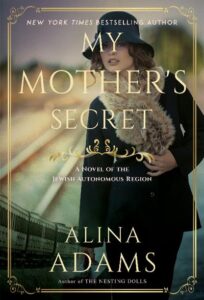 Author Alina Adams joins me today to chat about her new historical fiction, My Mother’s Secret: A Novel of the Jewish Autonomous Region.
Author Alina Adams joins me today to chat about her new historical fiction, My Mother’s Secret: A Novel of the Jewish Autonomous Region.
Bio:
Alina Adams is the NYT best-selling author of soap-opera tie-ins, figure skating mysteries, and romance novels. She was born in the former Soviet Union and immigrated to the United states with her family in 1977. Alina used her background as an immigrant from Ukraine to inform her previous historical fiction title, The Nesting Dolls, as well as the upcoming, My Mother’s Secret: A Novel of the Jewish Autonomous Region.
Welcome, Alina. Please tell us about your current release.
When you ask people, “What was the first independent Jewish state of the 20th century,” most will answer, “Israel.”
But that’s not correct. Twenty years before the United Nations established the state of Israel, Josef Stalin, of all people, created an Autonomous Jewish Region on the border of Russia and China. He urged all the Jews of the world to move there to live as free people – under the auspices of the USSR.
My Mother’s Secret: A Novel of the Jewish Autonomous Region tells the story of Regina, who fled to Birobidzhan in the 1930s to escape Stalin’s purges. And the story of Lena, her American-raised daughter, who returns to the USSR in an attempt to discover everything she was never told about her parents’ pasts.
What inspired you to write this book?
My previous book, The Nesting Dolls, was set during three time periods: Odessa and Siberia, USSR during the 1930s, Odessa, USSR during the 1970s, and present-day Brighton Beach, Brooklyn. Readers told me their favorite section was the one set in the 1930s, as they had no idea of what went on in the Soviet Union during that time. They wanted to learn more. And I’m a people pleaser! You want more secrets from behind the Iron Curtain circa the 1930s? You’ve got it!
Excerpt from My Mother’s Secret:
Moscow, USSR
1935
She had her ticket. All that was necessary now was to get on the train.
Regina glanced furtively over her shoulder. Yaroslavsky Railway Station was as bustling as ever. Men in grey suits and ties, patched jackets, and caps with brims that flopped into their eyes jostled women wearing wool coats trimmed with rabbit fur, some with kerchiefs over their heads, others sporting more fashionable berets. All rushed to board trains for Vladivostok, Kirov, Tomsk, and a host of other Eastern destinations. No one had any reason to pay attention to an eighteen year old girl struggling to drag a scuffed leather bag she’d thrown together a few hours earlier, blindly tossing in random items in Regina’s haste to be gone before the black-booted militsioners returned for her. They might only want to ask her questions about people she knew, people who’d already been arrested. They might arrest and then release her… if she provided them with the answers they were seeking. Or they might put her on trial. The kind of trial where an innocent verdict wasn’t an option. If Regina were braver, she might have stuck around to find out. If Regina were braver, she might have stuck around to defend her friends, who she knew had done nothing wrong, same as her. If Regina were braver, she wouldn’t currently be at the train station, glancing furtively over her shoulder.
She had her ticket. What she didn’t have was permission to leave. Or settle elsewhere. Soviet citizens were the freest in the world. Maintaining this freedom necessitated their leaders knowing where each was at all times. This led to stability, the seedbed of liberty. There were over two dozen scheduled stops between Moscow and Regina’s destination in the Far East. At any of them, the conductor could demand to review her propiska. If she failed to provide one, he had every right to yank her off his train and deposit Regina in the care of local authorities. Who would promptly, likely under armed guard, return her to Moscow. Where Regina’s attempt to run would bury her into deeper trouble. The proper course of action for those who wished to relocate to Birobiddzhan, the newly formed Jewish Autonomous Region (JAR) between the Bira and Bidzhan rivers of the Russian-Chinese border, was to register a request with KOMZET, the Committee for the Settlement of Jewish Toilers on the Land. KOMZET would authorize the appropriate travel documents. They might also bring her name to the attention of the authorities. She couldn’t risk that. Not until everything blew over. Which it would have to, sooner or later. Regina hadn’t done anything wrong. It wasn’t her fault she’d failed to realize until it was too late that those around her might have.
If only she could make it to Birobidzhan. Comrade Kaminsky, head of the village Soviet, would surely vouch for her loyalty to the state. They’d always had a good rapport whenever he’d visited Moscow. Regina had listened, enthralled, to his tales of Birobidzhan, its rich farmland, its plump livestock, the trees full of fruit and the rivers of fish. As Comrade Stalin had pronounced one month earlier, “For the first time in the history of the Jewish people, its burning desire for a homeland, for the achievement of its own national statehood, has been fulfilled.” It was one of the many reasons why all Soviet children, dressed in school uniforms of brown dresses with black pinafores for every day, white ones for special occasions for girls, or brown pants with white shirts for boys and crimson scarves for all began their day by reciting, “Thank you, Great Comrade Stalin, for my joyous childhood.”
KOMZET flourished under the oversight of Lazar Kaganovitch, Secretary of the Central Committee, Commissar of Communications, the most powerful Jew in the Soviet Union. “The nationality of the Jew is the nationality of the merchant,” he quoted Karl Marx when establishing the JAR. “Emancipation from huckstering and money will be the self- emancipation of our time.”
Regina had always intended to make her way there. She’d always intended to be part of the pioneer movement to build an independent, thriving, Jewish, socialist state, where Yiddish literature was taught in schools, Yiddish plays were performed in theaters, Yiddish newspapers educated the public, and Yiddish speakers could walk streets marked with Yiddish signs, safe from violent attacks. At the close of the Great October Revolution, Jews, like all worthy Soviet citizens, had been accorded their own plots of land to work. Unfortunately, the previous owners – kulaks Comrade Stalin needed to show the error of their ways a decade earlier – weren’t happy with the redistribution. Thus it was determined that, in the interest of keeping antisemitic violence to acceptable levels, the optimal course of action was to convince Jews living in the USSR and its surrounding territories to relocate to the furthest eastern point on the Trans-Siberian railroad, where they would be safe, out of the way, and no longer annoying their neighbors.
Regina had always intended to go. She didn’t need the posters paid for by ICOR, the American Association for Jewish Colonization in the Soviet Union; black and white lithographs promoting spending 50 kopeks on a lottery ticket to help “build a socialist Jewish Autonomous Region,” or garishly colored illustrations of workers with bulging muscles carrying sacks urging, “Let us give millions to settle poor Jews on the land and to attract them to industry.”
Regina had always intended to go. She simply hadn’t intended to go this soon. Or this hurriedly. She’d intended to finish University first. Regina was specifically studying agriculture, horticulture, animal husbandry, and medicine, human and veterinary, so that she could be of the most use once she arrived in her new home.
She never intended to be sneaking out of town, feeling, though it was the middle of the day, like a thief in the night, a scarf tossed over her head, chin pressed nearly into her chest, not making eye contact with anyone. Regina attempted to take as little space as possible, to shuffle her feet along the concrete station floor lest the clack of her high-heels attract attention.
She only looked up when it came time to hand her ticket to the conductor. She peered into his face, eyes open wide, lashes quivering, and offered her most dazzling smile – as well as a peek down her blouse. It was a maneuver she’d evolved during her early teens. It worked on male teachers wavering between a higher and lower grade on an exam. It worked on butchers to double-check if there was truly not a scrap of meat left for sale. It worked on boys who felt inspired to buy you a slice of Napolean cake. Regina could hope it worked on train conductors.
It did. He barely glanced at Regina’s ticket. He was too busy leering at her. And he never got around to asking for her travel documents.
What exciting story are you working on next?
My background is in television production. I’ve worked for ABC Daytime on their soap-operas, “All My Children,” “One Life To Live,” and “General Hospital,” and for Procter & Gamble on “As the World Turns” and “Guiding Light.” My next project combines the early days of radio soap-operas as they were transitioning to television… with the International Youth Festival of 1956, held in the USSR. You’ll have to read it to find out how they’re connected!
 When did you first consider yourself a writer?
When did you first consider yourself a writer?
Well, my parents claim my first words were “pencil” and “paper” (in Russian), so I guess I had my life planned out at an early age!
Do you write full-time? If so, what’s your work day like? If not, what do you do other than write and how do you find time to write?
I do write fulltime, but not just fiction. I am an education writer, and I write for a soap-opera website called SoapHub. My day is broken up into two parts, I write from 9 AM to noon on whatever is due soonest, which is usually the latest on what’s happening with schools in America – lots of emergencies there. Then, from noon to 2, I watch and write about soaps. Afterwards, it’s time to work on fiction or, more often, promote the fiction! I always tell aspiring writers that, as a fulltime author, your time is split into three parts: You spend one third of your time hustling for writing work, one third of your time actually writing, and one third working to get paid for what you’ve written!
What would you say is your interesting writing quirk?
I often have a drink or two before proofreading my work. It helps slow my mind down enough so that I’m not flying through it, reading that I thought I wrote, instead of what I actually did write.
As a child, what did you want to be when you grew up?
A writer. I knew I wanted to be a writer before I even know that was a job. I just wanted to tell stories My kids say I still tell stories, only now about their lives, and that I make them “more interesting.” They are not amused.
Anything additional you want to share with the readers?
When I worked in TV production, both on the soaps and in figure skating coverage for ABC, TNT, ESPN, and NBC, a director once called me a “visual wasteland.” I can’t tell stories in pictures… only words. On the other hand, readers tell me that my books read like TV shows, because I visualize them as scenes. So who knows!
Links:
Website | Twitter | Instagram | Substack
Thanks for being here today!
